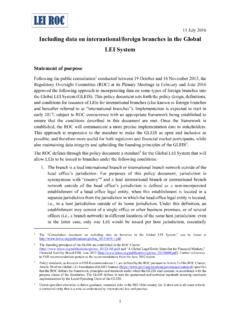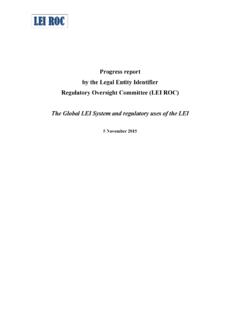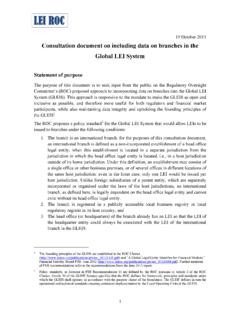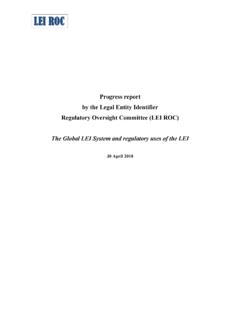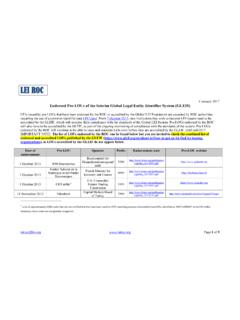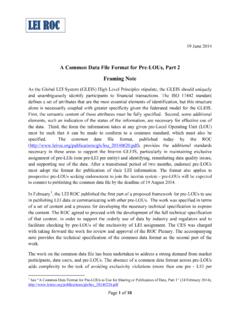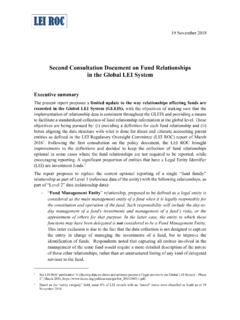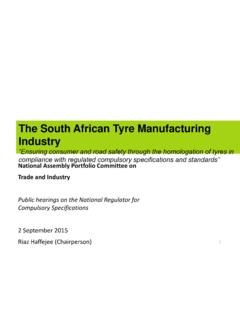Transcription of LEI ROC
1 lei roc 30 September 2015 Statement on INDIVIDUALS ACTING IN A BUSINESS CAPACITY Differences in the interpretation of the standards governing the Global LEI System (GLEIS) have been brought to the attention of the Regulatory Oversight Committee (ROC) concerning the eligibility to obtain an LEI by individuals acting in a business capacity. This statement is intended to provide clarity to the GLEIF, (pre-)LOUs1 and LEI registrants in order to improve consistent application among LOUs regarding registrant eligibility for LEIs. This statement clarifies that: - individuals acting in a business capacity are eligible to obtain LEIs, provided they conduct an independent business activity as evidenced by registration in a business registry, with only one LEI issued for the same individual and adequate verifications that data protection, privacy or other obstacles do not prevent the publication of the current LEI data file; - other individuals are not eligible to obtain LEIs including, but not limited to: natural persons acting in a private or non-professional capacity; and professionals acting as employees (as opposed to trading in their own names), even if they are subject to some form of licensing or authorisation by a financial regulator.
2 Any specific identification needs concerning professionals acting as employees2 will be considered separately in the future by the ROC. This statement does not require issuance of an LEI to an individual acting in a business capacity, but rather is intended to prevent issuance when the conditions described in this statement are not met. The FSB report, A Global Legal Entity Identifier for Financial Markets ( FSB Report ), specifies under recommendation 8 a definition for legal entities that corresponds to the ISO 17442:2012 standard ( ISO Standard ). 3 The report s definition excludes natural persons. The report does not 1 Local Operating Units (LOUs) of the Global LEI System are the utilities providing LEI registration and other services.
3 The expression pre-LOUs is used to specifically refer to the LOUs endorsed by the ROC before the Global LEI Foundation is able to assume the function of accrediting LOUs. This statement applies to both pre-LOUs and future LOUs. 2 For example, employees licensed or authorised by a financial regulator. 3 FSB recommendation 8: Eligibility of legal entities to apply for an LEI should be broadly defined, in order to identify the legal entities relevant to any financial transaction. No more than one LEI shall be assigned to any legal entity. Further details, including the definition of legal entities, are provided page 35 of the report. Under ISO 17442:2012: The term legal entities includes, but is not limited to, unique parties that are legally or financially responsible for the performance of financial transactions or have the legal right in their jurisdiction to enter independently into legal contracts, regardless of whether they are incorporated or constituted in some other way ( trust, partnership, contractual).
4 It excludes natural persons, but includes governmental organizations and supranationals. 2 discuss that for a variety of reasons, including privacy concerns, the GLEIS should not cover natural persons when they are acting in a private capacity. However, the definition of legal entities in the FSB Report and ISO Standard includes entities that are not incorporated, and refers first and foremost to abilities ( being legally or financially responsible for the performance of financial transactions and to have the legal right in their jurisdiction to enter independently into legal contracts ). In addition, both the FSB Report and the ISO Standard specify that examples of eligible legal entities include, without limitations, all financial intermediaries ; all entities that issue equity, debt or other securities for other capital structures ; all entities under the purview of a financial regulator ; and counterparties to financial transactions.
5 The ROC has surveyed its membership and has found instances in which ROC member jurisdictions included individuals acting in a business capacity in each of these four categories. In order to identify the extent and the exact nature of the issue, the ROC has conducted a survey of endorsed and operational pre-LOUs. Based on the responses received from 20 pre-LOUs, 3905 LEIs were reported to have been issued to individuals as of March 2015 . It is not clear whether each of these individuals sought and received an LEI to identify themselves when acting in a business capacity. A majority of LOUs reported interest by individuals in obtaining an LEI. Nine pre-LOUs reported that they currently provide LEIs to individuals while the remaining (pre-)LOUs stated they refrained from issuing LEIs to any natural person, even if acting in a business capacity.
6 In providing this statement, the ROC is guided by the relevant principles governing the GLEIS, in particular the GLEIS High Level Principle 2 that the LEI system should meet the requirements of the global regulatory community for accurate, consistent and unique entity identification and FSB recommendations 2 and We note, however, that any clarification of the extent to which individuals acting in a business capacity are eligible to obtain an LEI must be compatible with ISO Standard 17442:2012 and conducted within the limits of the current framework. It follows that LEI eligibility shall not be granted to individuals in their capacity as natural persons but only to individuals in their capacity as business entities due to their special status granted within jurisdictions. Therefore, this document clarifies under which conditions an LEI may though not necessarily must be issued and maintained for an individual acting in a business capacity, to ensure consistency among (pre-)LOUs.
7 These conditions correspond to additional precautions that are necessary to maintain consistency of LEIs issued to individuals acting in a business capacity with the following principles: - Compliance with the definition of legal entities (FSB recommendation 8); - Uniqueness and exclusivity (FSB recommendations 1 and 8); 4 Recommendation 2: GLOBAL REGULATORY COMMUNITY REQUIREMENTS The LEI system should meet the requirements of the global regulatory community (including supranational organisations). The potential benefits of the LEI include: to support authorities in fulfilling their mandates to assess systemic risk and maintain financial stability; conduct market surveillance and enforcement; supervise market participants; conduct resolution activities; prepare high quality financial data and undertake other regulatory functions.
8 Recommendation 10: REVIEW OF SCOPE OF COVERAGE The ROC should undertake regular reviews of the scope and extent of coverage of the LEI to reflect emerging regulatory and market requirements for the LEI use according to an agreed schedule [..] Eligibility of legal entities to apply for an LEI should be broadly defined, in order to identify the legal entities relevant to any financial transaction. No more than one LEI shall be assigned to any legal entity. 3 - Accuracy of LEI reference data as described in FSB recommendation 18; - Availability in the public domain, without limit on use or redistribution, of LEI data and reference data (FSB recommendation 31). These additional precautions build on, and do not replace, the due diligence that pre-LOUs must apply to the issuance of any LEI. The ROC is aware that the present additions to the Interim Principles to be observed by pre-LOUs may need to evolve in the future, but believes that current differences in practice require immediate clarifications.
9 Finally, to maintain consistency with existing recommendations, this document does not seek to address situations where several individuals have formed an unincorporated entity based on a contractual arrangement ( partnership), or the case of other arrangements without legal personality, such as trusts or other fiduciary arrangements, even where the trustee (or equivalent) is a natural person. Partnerships and trusts are already mentioned in the FSB Report and ISO Standard among the examples of eligible entities. 1. Eligibility: The GLEIS should establish processes that verify that the individual is conducting an independent business activity as evidenced by registration in a business registry Clear processes have to be in place within the GLEIS to avoid the issuance of an LEI to natural persons that are not covered by the ISO Standard 17442:2012.
10 The LOU must verify that the individual is conducting an independent economic activity and should do so by ensuring that the individual is registered in a business registry. The ISO Standards Advisory Group (SAG) for ISO 17442 noted that a strict definition of business registry was not intended in the ISO 17442 standard. In some instances, tax registries or registries of regulated entities held by a financial regulator are the only registries recording the existence of a legal entity. At the same time these registries may have a variety of purposes and LOUs should, for the purpose of determining whether an individual is acting in a business capacity to verify LEI eligibility, only take into account records that evidence an independent business In order to carefully limit the scope of eligible individuals acting in a business capacity, the reference to an independent business activity excludes: - the private or non-professional activity of a natural person; - professionals acting as employees (as opposed to trading in their own names), even if they are subject to some form of licensing or authorisation by a financial regulator.
